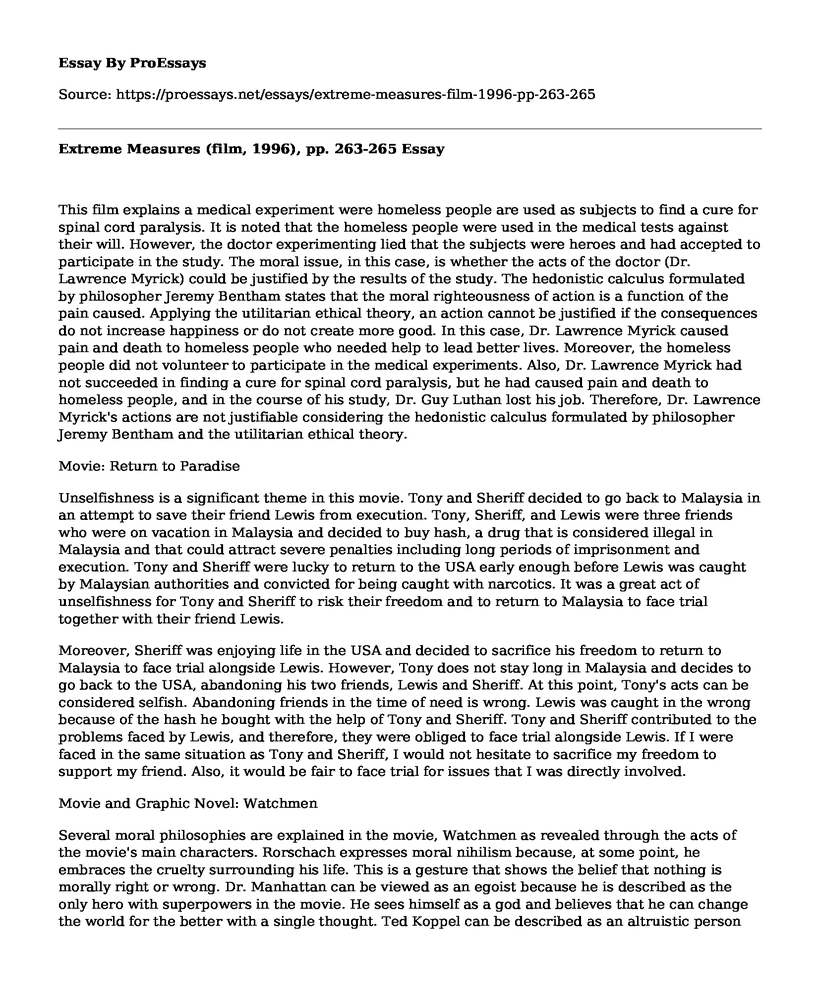This film explains a medical experiment were homeless people are used as subjects to find a cure for spinal cord paralysis. It is noted that the homeless people were used in the medical tests against their will. However, the doctor experimenting lied that the subjects were heroes and had accepted to participate in the study. The moral issue, in this case, is whether the acts of the doctor (Dr. Lawrence Myrick) could be justified by the results of the study. The hedonistic calculus formulated by philosopher Jeremy Bentham states that the moral righteousness of action is a function of the pain caused. Applying the utilitarian ethical theory, an action cannot be justified if the consequences do not increase happiness or do not create more good. In this case, Dr. Lawrence Myrick caused pain and death to homeless people who needed help to lead better lives. Moreover, the homeless people did not volunteer to participate in the medical experiments. Also, Dr. Lawrence Myrick had not succeeded in finding a cure for spinal cord paralysis, but he had caused pain and death to homeless people, and in the course of his study, Dr. Guy Luthan lost his job. Therefore, Dr. Lawrence Myrick's actions are not justifiable considering the hedonistic calculus formulated by philosopher Jeremy Bentham and the utilitarian ethical theory.
Movie: Return to Paradise
Unselfishness is a significant theme in this movie. Tony and Sheriff decided to go back to Malaysia in an attempt to save their friend Lewis from execution. Tony, Sheriff, and Lewis were three friends who were on vacation in Malaysia and decided to buy hash, a drug that is considered illegal in Malaysia and that could attract severe penalties including long periods of imprisonment and execution. Tony and Sheriff were lucky to return to the USA early enough before Lewis was caught by Malaysian authorities and convicted for being caught with narcotics. It was a great act of unselfishness for Tony and Sheriff to risk their freedom and to return to Malaysia to face trial together with their friend Lewis.
Moreover, Sheriff was enjoying life in the USA and decided to sacrifice his freedom to return to Malaysia to face trial alongside Lewis. However, Tony does not stay long in Malaysia and decides to go back to the USA, abandoning his two friends, Lewis and Sheriff. At this point, Tony's acts can be considered selfish. Abandoning friends in the time of need is wrong. Lewis was caught in the wrong because of the hash he bought with the help of Tony and Sheriff. Tony and Sheriff contributed to the problems faced by Lewis, and therefore, they were obliged to face trial alongside Lewis. If I were faced in the same situation as Tony and Sheriff, I would not hesitate to sacrifice my freedom to support my friend. Also, it would be fair to face trial for issues that I was directly involved.
Movie and Graphic Novel: Watchmen
Several moral philosophies are explained in the movie, Watchmen as revealed through the acts of the movie's main characters. Rorschach expresses moral nihilism because, at some point, he embraces the cruelty surrounding his life. This is a gesture that shows the belief that nothing is morally right or wrong. Dr. Manhattan can be viewed as an egoist because he is described as the only hero with superpowers in the movie. He sees himself as a god and believes that he can change the world for the better with a single thought. Ted Koppel can be described as an altruistic person because he reveals that Dr. Manhattan had infected several people with cancer. This shows that Ted Koppel was concerned about the welfare of others. Utilitarian ethical theory is expressed in the acts of Veidt who plans to unify the USA and the USSR by destroying the world's main cities. It is a good idea to kill a few people to unite two great nations. Rorschach is portrayed Katian moral views because he takes up the responsibility of investigating moral evils like murder. We must do the right thing or to stop others from engaging in evil acts.
Work Cited
Extreme Measures. Dir. Michael Apted. Simian Films. Columbia Pictures, 1996.
Return to Paradise. Dir. Joseph Ruben. PolyGram Films, 1998.
Watchmen. Dir. Zack Snyder. Warner Bros. Pictures, 2009.
Cite this page
Extreme Measures (film, 1996), pp. 263-265. (2022, Oct 25). Retrieved from https://proessays.net/essays/extreme-measures-film-1996-pp-263-265
If you are the original author of this essay and no longer wish to have it published on the ProEssays website, please click below to request its removal:
- Research Process for Stuyvesante Jewelry Inc
- A Review of the European Communication Monitor (ECM) Report 2016 Paper Example
- Questions on Epidemiology Paper Example
- Team-Based Healthcare: Benefits & Challenges - Essay Sample
- Essay Example on Daily Coffee Drinking: A Need or a Habit?
- Research Paper on ADHD: Definition, Causes, Symptoms, & Treatment
- Paper Example on Doctors & Patients: Meeting Challenges in Treatment through Technology







